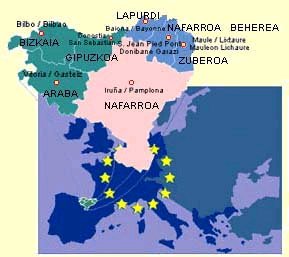Homepage
Page d'accueil
Page en français
| Homepage |
Page d'accueil |
Page en français |
 |
 |
 |
Split in two parts between France and Spain, the Basque Country rests between sea and mountains. It is constituted by 7 provinces :
 |
Alava, with Vitoria-Gasteiz as main town, which is also the Euskadi's autonomous community's capital. |
 |
Biskay, with Bilbao as main city. |
 |
Guipuzcoa, with Donosti-San Sebastian as main town. |
 |
Low Navarra, with Saint-Jean Pied de Port as main town. |
 |
Lapurdi, with Bayonne as main town. |
 |
Xubero, with Mauleon as main town. |
 |
Navarra, with Pamplona/Irunea as main town. |
The three first provinces are gathered in Euskadi's
autonomous community and are, together with Navarre, integrated in spanish
kingdom. Euskadi's autonomous community has obtained its autonomic
status since 1979. It has its own parliament
and its own government.
It has authority in Health, Education, Police, Culture, Economy, Justice, and
some other fields. Each province also has its own government, the Diputaciones
Forales, which administrate at province level some of powers transferred
from Madrid central government to Euskadi's basque government. This autonomy
is guaranteed by a financial independence. Indeed, the basque administration
is in charge of raising taxes in exchange for a financial contribution to Madrid
central government for general expenditures.
The three
Northern provinces are gathered in the French Republic and are a part of
the french departement of Pyrénées Atlantiques,
despite the northern basque people's wish to obtain a separated
departement.
Even if many people only see in Basque Country a tourist destination or a
terrorist nest, Basque people has its own history
and culture. And, this culture is what many of us
are trying to preserve and defend facing the culture from the states in which
we are integrated. All the same as they are trying to preserve and defend their
culture against a cultural globalisation. We consider that basque culture preservation
is an as legitimous struggle as the one they undertake to defend their culture.
But an important part of us, mainly in the Southern part, consider that our
culture would only be preserved if an independent country is created. At the
time when European Community is getting more and more integrated so as to enjoy
the synergy created by the economic union, this struggle appears as old-fashioned.
But, despite Spain has become a democratic country and despite the large autonomy
the Southern Basque enjoy, many basque consider the independence struggle as
a resistance struggle against colonisation. Thus, part of us, in which I don't
recognise myself, think legitimous to use terrorism and intimidation to reach
their goal.
The Basque Country is also a economically dynamic zone :
 |
The Euskadi's autonomous community is the second spanish economic pole after Catalonia. It has a 450 millions euros budget and has the right to fix and collect direct and indirect taxes. With its high demographic influence (its agglomeration gathers nearly the half of Euskadi population), Bilbo is the Basque Country financial capital and one of its most important economic driving force. Its stock exchange, as Madrid and Barcelona ones, gives the spanish economy's temperature. |
 |
Northern basque country economy is less dynamic than the Southern one. But, it's being developing, mainly in the coastal area, owing to the cross-frontier co-operation. |
To conclude this webpage, I invite you to visit the webpages I have dedicated
to the Northern Basque Country economy, the basque
people history and the basque culture. I also
suggest you to discover the Basque Country through my
best excursions in Northern Basque Country and in
Southern Basque Country.
Finally, here follow some pratical links that will complete this description
:
 |
the Buber basque page, which with its numerous links, ordered by items, can be considered as the Basque Country portal. |
 |
If you are looking for basque cultural products - books in basque language or dealing with Basque Country, CD of basques groups or singers (from the oldest to the newests), methods to learn Euskara,... - you should visit Elkarlanean's website. |
 |
If you are basque or if you love basque culture and if you live in Paris and its area, if you want to meet other basque people you should go to the Basques' House of Paris. |
 |
If you want to stay or to come in the Upper Xubero area, here is the personnal website of an inhabitant which fully describes the accomodations together with this area's economic and leisure activities. |